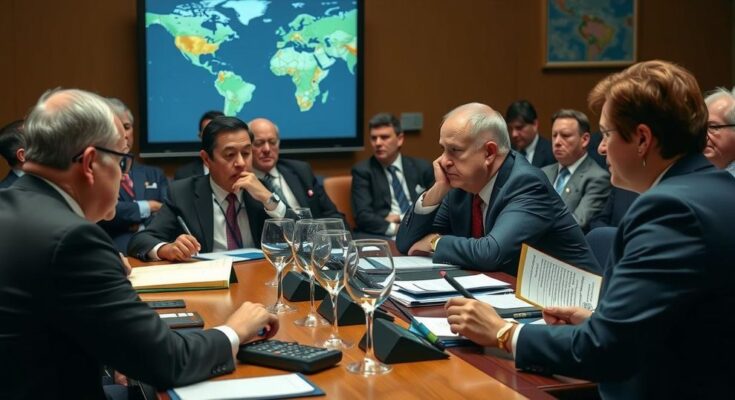The European Union has upped its climate finance proposal to assist developing nations facing severe effects from climate change, raising it to $300 billion annually as a response to initial rejection of an offer of $250 billion. Negotiations continue under time constraints at the COP29 conference in Baku, with particular emphasis on fossil fuel phase-out commitments. Activist coalitions and developing country representatives remain firm in their demands for fair climate financing, underscoring the critical nature of achieving a successful international agreement.
In a bid to revive negotiations at the COP29 climate conference in Baku, the European Union has raised its financial support proposal for developing countries severely impacted by climate change to $300 billion annually. This decision was marked as essential, particularly after developing nations rejected an earlier offer of $250 billion. Reports indicate that discussions focused on the EU’s insistence for wealthy nations, including the U.S., to agree to this increased funding, contingent upon a broader climate agreement which includes critical reviews of fossil fuel phase-out efforts. Notably, resistance has emerged from Saudi Arabia in response to calls for more stringent fossil fuel transition commitments.
Irish Climate Minister Eamon Ryan expressed optimism regarding potential agreements, emphasizing the importance of presenting a united front in addressing climate challenges to restore global faith in multilateral cooperation. Meanwhile, Ali Mohamed, chair of the African Group of Negotiators, underlined the critical nature of financing discussions to avert a breakdown in the conference, rejecting any insufficient proposals as detrimental to progress. A coalition of over 300 activist organizations has urged developing nations to maintain a steadfast stance during negotiations, condemning developed nations for sidestepping legal obligations regarding climate financing. \n
Despite aspirations for a higher collective commitment of $1.3 trillion annually to address climate adversities, the majority of this support is projected to derive from private sources rather than direct government funding. Given the current context, even the proposed funding of $250 billion surpasses the existing commitment of $100 billion made by wealthy nations, which is set to expire.
The ongoing dialogue on climate finance at the COP29 conference reflects the urgent need for financial assistance to developing nations, particularly as they face increasing climate-related challenges such as droughts and natural disasters. Historical discussions have often centered around the disparities in contributions from wealthy nations to poorer countries, highlighting the tensions in balancing national interests and global responsibilities. Funding commitments have been critical in shaping ongoing climate agreements and raising awareness of the challenges posed by climate change to vulnerable populations worldwide. The proposal for $300 billion per year signifies a crucial step in addressing these imbalances and fostering international cooperation.
In conclusion, the EU’s increased financial offer of $300 billion per year for developing nations underscores the urgent need for effective climate funding amidst a backdrop of escalating climate challenges. The negotiations at COP29 serve not only as a platform for addressing financial commitments but also as a litmus test for global cooperation in mitigating climate change. The resistance from oil-dependent nations and the clarion call from civil society to hold wealthy nations accountable highlight the multifaceted challenges that lie ahead in achieving a fair and sustainable climate agreement.
Original Source: www.rfi.fr




